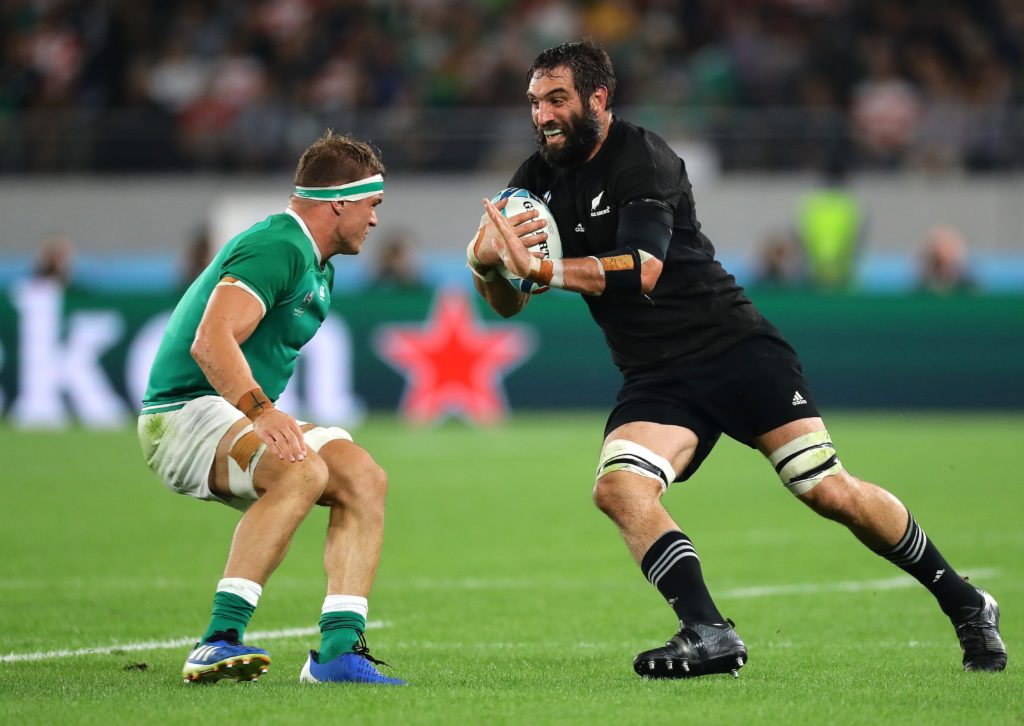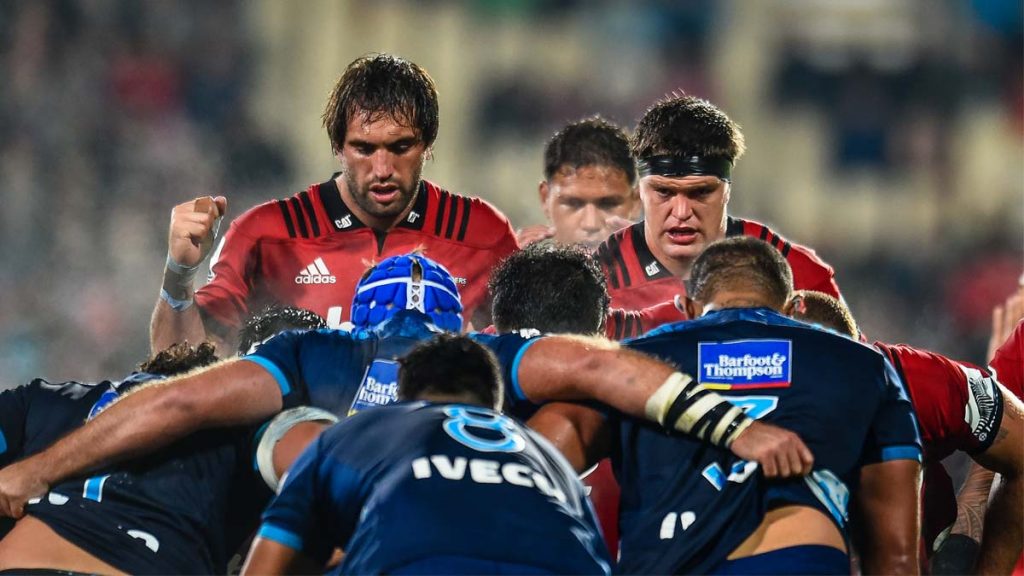The Rugby Centurions Podcast will feature many of the game’s biggest names, men and women who have breached the remarkable benchmark of 100 international caps. Their wisdom, tales, achievements and regrets will regularly be shared on The XV.
There are a lot of perks to being an All Black legend: respect from your team-mates, admiration from your foes, hero worship from the New Zealand fans, to name just three. But for Sam Whitelock, one of the big highlights has been to sit at the back of the team bus.
After winning 121 caps, two World Cups in 2011 and 2015 and captaining both his country and the Crusaders, Super Rugby’s dominant force, the 32-year-old lock has earned the right to sit where he wants. He could probably drive the bus if he fancied it. But in the All Black camp, the tradition is that the grizzled veterans take up the seats at the back; the fresh-faced youngsters at the front. Whitelock still recalls the coach journeys before his Test debut in 2010 (although it would be a difficult one to forget) against Ireland, when he came off the bench to replace Brad Thorn and ended up scoring two tries.
“I was kind of just keeping my head down. Don’t say anything, don’t look at all those scary guys down the back seats of the bus,” Whitelock tells The Rugby Centurions Podcast. “So I sneak on the bus and sit on the first seat I find. Despite being a tall guy, if I just made myself look small, I won’t have to do music or any of those things.
“It’s amazing because I played with Brad Thorn at the Crusaders and he kind of sidled up right beside me and said, ‘Right, you and me are rooming this week’. I was like, ‘That’s a good sign’. And then when I got named (on the bench), Thorney was awesome, he told me everything I needed to know. He didn’t take the mickey too much because I’m sure if he’d said, ‘Do this’, I would have gone and done it.
The longer you’re around, the further back you go. And if there’s too many people on the bus, the young guys will stand up… It’s all done with respect in mind and it’s pretty cool to be a part of.
Sam Whitelock
“I’m pretty sure I made him a cup of tea. It’s the tradition with the room-mate that if you’re younger, you make a cup of tea. It used to be the old chocolate biscuits, but the nutritionist tried to stamp that out quick. But some of those traditions are awesome. And the bus is one that will always be around: the longer you’re around, the further back you go. And if there’s too many people on the bus, the young guys will stand up. The older guys are keen to let them work it out but sometimes you’ve got to go down and go, ‘Right, if you haven’t played a Test match, you’re in front of the door’. It’s all done with respect in mind and it’s pretty cool to be a part of.
“When I first started, we had a group of senior guys, so I think I went back one seat over two years. If you time it right, you can go back four or five seats in a season just because some older guys leave, or get dropped, whatever it is. But for me on the bus, it’s funny, it’s changed. When you first get on there you’re talking about, ‘Right, who’s on music? Please not me…’, all that kind of stuff. And then you kind of move a little bit further back and then by the time you get to the back seat of the bus, where I am now, it’s Aaron Smith and Beauden Barrett and myself and you’re talking about kids, ‘Haven’t seen them for a while’, ‘How many have you got?’ The conversation changes massively.

“So that’s how you do it, just keep doing it on your number (of caps) and the further you go back, then you get to the back seat, which is awesome. But there’s only one seat, so there’s always a bit of a joke around it being an ejector seat. It’s got to go off at some stage. You can’t keep getting on the bus. You either get too old or too slow or look for a different challenge in life.”
Talking of traditions, the Whitelock family also have one with the All Blacks. Brothers Luke and George have played for New Zealand, following in the footsteps of their grandfather, Nelson. And if you think Sam is a hard player, his Grandad took it to a whole ‘nother level.
“Nelson played for the All Blacks in the 1953-54 tour to the UK and France. He played lock, he was the older guy of of the tour and his nickname was ‘Dad’,” said Whitelock.
“We’re all grown-up kids but Mum still loves to smother us with presents at Christmas, as all parents do. She found a whole lot of footage, through some different connections, of Grandad playing. So we’ve actually got now a hard drive of some of the games he played against internationals and the provincial sides that they used to do on those big, long tours. It’s really special because Grandad actually scored at Twickenham and they won, I think it was 5-0, and seeing that footage was awesome. He caught the ball and ran over top of the winger, the poor little winger got knocked out, but it was really cool to be able to see him out there playing, enjoying it.
“I think then they played a Grand Slam. So every time we go to Wales, I pretty much know that I’m going to get a question by a reporter who knows that the last time Wales beat the All Blacks was ’53.”
Grandad used to get a bit of wood, which he put it inside the hole that was left in his knee, where the shin bone was, and he’d tape it up, put a sock over, and he’s good to go.
Sam Whitelock
Whitelock added: “Grandad was serving during World War Two. They were lined up in a boat, three guys in a line, and they were bombed, shrapnel went off and the person standing next to Grandad had nothing, he was clean, healthy as, Grandad had shrapnel hit his leg just below his knee, blew a big hole in his shin, and the other person next to him was killed instantly.
“So Grandad’s war was over before it started. He travelled back to New Zealand, went through the normal thing around surgery and the one of the surgeons wanted to take his leg but someone else must have known that he was a promising rugby player, so they did everything to save it. After months and months of hospital, rehab, all those things, Grandad got to be able to walk, run, and then eventually he went back to the farm.
“In those days, you were a farmer before a rugby player. What Grandad used to do was get a bit of wood, which he put it inside the hole that was left in his knee, where the shin bone was, and he’d tape it up, put a sock over, and he’s good to go. It’s pretty amazing what people did in that time to get out there and play the sport we love now. It’s sometimes really good to look back and go, ‘Wait, hang on, I’ve got a sore finger or shoulder. This is actually nothing compared to what people have been through’.”
Rugby has never been a job. If it ever turns into that, I’d hope my friends and family would say, ‘Right, it’s time to give up and go do something else’.
Sam Whitelock
Whitelock has achieved everything he can in the game, so what is pushing him on when a lot of players in their thirties might be eyeing up the pipe and slippers of retirement?
“For me, rugby has never been a job. If it ever turns into that, I’d hope my friends and family would say, ‘Right, it’s time to give up and go do something else’,” said Whitelock. “But I love the challenge. I love the challenge of being the underdog, or the person that is expected to play well. You’ve just got to get out there and front up and it’s something that I enjoy. Sometimes it is easy to go, ‘Well, I don’t really feel like doing it today’ because it’s wet and cold, or you’re sore and it has been a big, long season.

“I’ve always been big on goal-setting. Every year, I sit down and take a couple of weeks to think about what I want to improve on and how you want to be better and break it down to achievable bits of the season. I’ve been pretty lucky to achieve some of those goals.
“I think that was really set up at school. We had some awesome coaches and teachers who definitely drove us to be better all the time. The foundation we had there definitely led us to go on and be whatever we wanted to be, whether that was a doctor or a sports person, which is humbling when you look back at where we were to where we have got to now.”
The Rugby Centurions Podcast will feature many of the game’s biggest names, men and women who have breached the remarkable benchmark of 100 caps. Their wisdom, tales, achievements and regrets will be shared on The XV each week.
If you’ve enjoyed this article, please share it with friends or on social media. We rely solely on new subscribers to fund high-quality journalism and appreciate you sharing this so we can continue to grow, produce more quality content and support our writers.


Comments
Join free and tell us what you really think!
Sign up for free